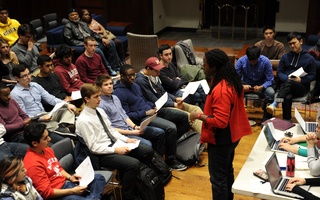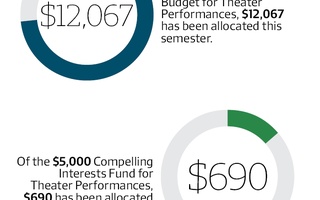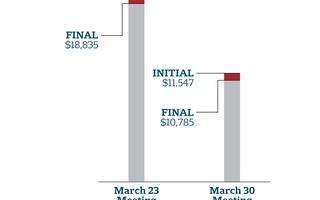Student organizations that receive grants this semester within the top 20 percent of the Undergraduate Council’s allocations—a figure that translates to about $1,000 per group—will be required to send a majority of their executive board members to sexual assault training.
On Wednesday, the UC’s Finance Committee passed several amendments to recent legislation that established bystander intervention training requirements for some student organizations. The Office for Sexual Assault Prevention and Response and the Consent Advocates and Relationship Educators will lead the training sessions, which will begin after student groups are notified of the new policy, according to Finance Committee Chair William A. Greenlaw ’17.
The amendments set thresholds for groups that fall within the new requirements. When the committee passed the policy last week, members only specified that the training requirement would apply to “high-value” grants, and would require executive boards to meet an attendance threshold at sexual assault training sessions.
A recommendation by newly-elected Pforzheimer House representative Neel Mehta ’18 set the “high-value” threshold at the top quintile of grant-receiving organizations based on grant allocations from previous semesters. Under the rule, student organizations will be required to undergo training if they request UC funding this semester in equal or greater amounts compared to funds provided to the top 20 percent of grant-receiving organizations last spring.
Greenlaw estimates that the threshold will hover around $1000 this semester. Of the 287 student organizations that requested UC funding last year, 58 that requested UC funding last spring received more than $1,000, including major cultural organizations, conferences, and club sports, according to Greenlaw. {shortcode-c14a90c613b722cc755f4553638d7058b8530c47}
“Setting it at this amount allows us to get a very wide range of people,” Greenlaw said.
A majority of a club’s executive board will be required to attend the training, the committee decided.The committee also unanimously passed amendments that further clarified the logistics of the sexual assault training requirements. One amendment formally exempted organizations that already have strategic partnerships with OSAPR and receive sexual assault training.
“For groups that are already doing what this policy is proposing, they’re exempt,” Greenlaw said.
Another amendment, proposed by Elm Yard representative Evan M. Bonsall ’19 and passed unanimously, allows students who serve as executive board members of multiple organizations to meet the training requirement just once.
“I think that what we need to do is make sure that this program is effective, but also that people don’t perceive it as a bunch of red tape,” Bonsall said.
During the meeting, the Finance Committee also separately considered establishing a loan program that would allow student organizations to borrow money from the UC to pursue for-profit projects. The Finance Committee currently allocates funds to student organizations only in the form of grants.
The group discussed fundraising events—which the Finance Committee currently does not fund—and theatrical performances as potential loan recipients.
“I want to abolish the current fundraising rule,” Greenlaw said. “But [student organizations] would have to pay a portion of it back.”
Finance Committee representatives debated how the UC would enforce the loan repayments; Greenlaw suggested that any outstanding debts could be subtracted from a group’s subsequent grant requests. The proposal is still tentative, according to Greenlaw, and representatives have yet to determine a formal policy that would specify loan repayment requirements.
The Finance Committee will continue to debate the measure over the next few weeks, Greenlaw said.
–Staff writer Brian P. Yu can be reached at brian.yu@thecrimson.com. Follow him on Twitter @brianyu28.
Read more in College News
Student Creates App to Track HUDS Grill Orders
















